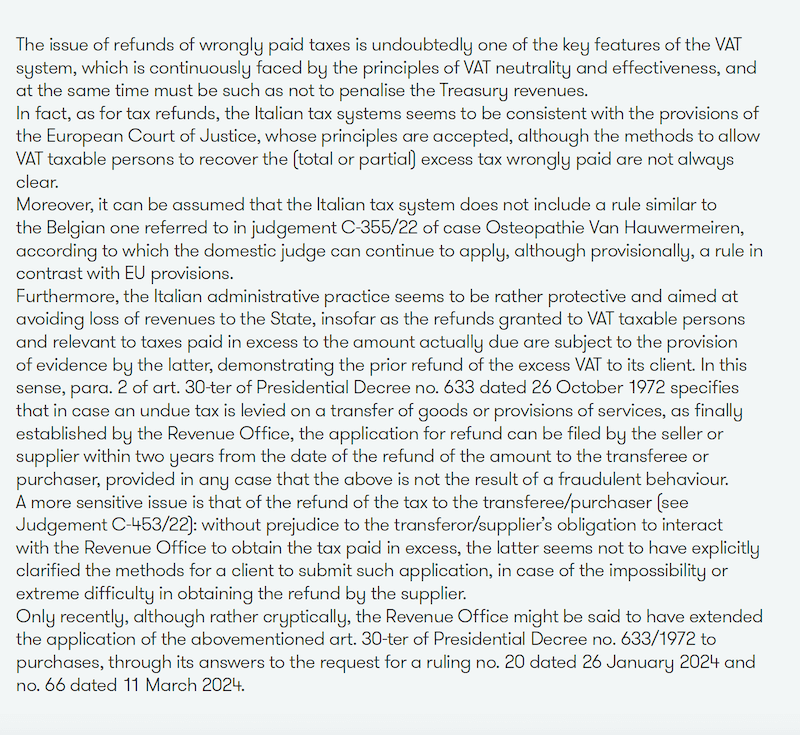Judgments of the European Court of Justice no. C-453/22 dated September 7, 2023, Michael Schütte case, no. C-355/22 dated October 5, 2023, Osteopathie Van Hauwermeiren case, and no. C-606/22 dated March 21, 2024, B. sp. z.o.o. case.
By Mario Spera - Principal of Bernoni Grant Thornton
1. Introduction
The European Court of Justice (hereinafter, CJEU) focuses on a particularly relevant matter, referring to the possibility for the VAT taxable person to obtain a reimbursement of the overpaid tax. The CJEU has recently analyzed this matter in judgment no. C-453/22, in which a VAT taxable person, a farmer and forester, purchased timber from his suppliers at a higher rate compared to that applied by the same VAT taxable person to his customers, qualifying the transferred goods as firewood.
The same matter is analyzed from a different perspective in judgment no. C-355/22, in which the Court focused on the possibility to obtain the reimbursement of VAT paid in relation to transactions qualified as taxable but that were recognized then as VAT exempt.
A third similar matter is analysed in judgment no. C-606/22 and concerns the possibility for the VAT taxable person to obtain the refund of overpaid VAT, if no invoice was issued with reference to the concerned transaction, but this was rather documented through a cash register receipt.
2. Case C-453/22
This is a case occurred in Germany, where the VAT taxable person Mr. Michael Schütte, within his activity as farmer and forester, purchased timber at a VAT rate of 19% and sold it to his customers at a reduced rate of 7%, qualifying it as firewood. The VAT taxable person deducted the whole input VAT paid. However, the Tax Authorities challenged the application of the reduced rate to sales transactions, claiming the payment of unpaid VAT. The tax assessment was contested and, during the Court proceedings, that court held that the output transactions were indeed subject to the reduced VAT rate, and took the view that the purchases made by the VAT taxable person were also subject to the reduced rate of 7% and the deduction of input VAT by Michael Schütte was, as a result, reduced accordingly.
Then, the VAT taxable person contacted his suppliers for them to pay him the overpaid tax but they objected the impossibility to meet such request due to the defence of limitation provided for under German civil law against the VAT taxable person.
The VAT taxable person applied to the tax office for discharge, on grounds of equity, from the additional VAT recovery, but the tax office rejected that application on the ground that the VAT taxable person himself was responsible for the situation. The referring court’s concerns also relate to the fact that the suppliers could have claimed for a reimbursement of overpaid VAT and the relevant adjustment would not have had a limitation period.
Michael Schütte then referred to the Court of Justice the question concerning the possibility for the VAT taxable person, based on the principle of fiscal neutrality and the principle of effectiveness, to claim reimbursement of the VAT overpaid by him to his upstream suppliers directly from the tax authorities, even though there is still a possibility that the upstream suppliers will at a later point in time take action against the tax authorities on the basis of a correction of the invoices, and the tax authorities may then – possibly – have to reimburse the same value added tax twice, with no right of recourse against the applicant.
3. Person entitled to claim for VAT refund
This matter was analysed by the CJEU, mainly in judgments no. C-35/05 dated March 15, 2007, Reemtsma Cigarettenfabriken case, and no C-564/15 dated April 26, 2017, Farkas case, which highlight the absence of Community rules on applications for the repayment of, s it is for the domestic legal system of each Member State to lay down the conditions under which such applications may be made, in observance of the principles of equivalence and effectiveness, so that the same rules are applied to similar transactions.
In particular, the following criterion operates in all Member States. The relationship between the seller/supplier and the purchaser/recipient of the services implies two different obligations: on the one hand, the seller/supplier may seek reimbursement of the sums unduly paid as VAT to the tax authorities; on the other hand, the purchaser/recipient of the services may bring a civil law action against that supplier for recovery of the sums paid but not due.
This would allow the purchaser/recipient to realize a perfect tax neutrality, since the same could obtain reimbursement of the sums unduly paid (see judgment no. C-35/05, point 39 and no. C- 564/15, point 51).
However, if reimbursement of the VAT becomes impossible or excessively difficult to obtain for the seller/supplier, the purchaser/recipient may address his application for reimbursement to the tax authority directly (see abovementioned judgments, points 41 and 53 respectively). Thus, each Member States must provide for the necessary operating procedural rules in order to respect the principle of effectiveness.
With reference to the above conclusions, in recent judgment no. C-453/22, the CJEU points out that the purchaser, failing any established fraud, abuse or negligence on his or her part, is fully entitled to address his or her application for reimbursement, and provided that there are effective reasons that make it impossible for the purchaser to obtain reimbursement of VAT from the suppliers.
In judgment no. C-453/22, the Court also specifies that if suppliers, after relying on the limitation period vis-à-vis the purchaser, then rectified the situation to obtain the reimbursement from the tax authorities, they would demonstrate exclusively their willing to obtain a tax advantage, and this practice should be recognized as abusive and, therefore, not admissible, thus precluding the risk of double reimbursement (see point 33).
Lastly, the judgment concludes that, in favour of the purchaser/receiver of services, “failing reimbursement of the VAT improperly charged by the tax authorities within a reasonable time, the damage suffered on account of the unavailability of the amount equivalent to that improperly charged VAT must be compensated by the payment of default interest”.
4. VAT refund in favour of the supplier
The other judgements mentioned in the introduction offer the opportunity to analyse some specific cases of recovery of VAT by the supplier, in the event of one of the two following hypothesis occurring after its payment to the Revenue Office: i) the transaction carried out is recognised as VAT exempt and thus it should not have given rise to the payment of VAT (C-355/22); ii) the transaction should have been subjected to a lower VAT rate, thus leading to a lower tax payable (C-606/22), but the only relevant evidence was a cash register receipt.
The first case is a peculiar one and refers mainly to the Belgian tax regulation, in which a judge could rule that the effects of the taxability of a transaction be maintained despite the different interpretation of the same matter by the EU Court of Justice, which led to consider the transaction as VAT exempt. In particular, this concerned osteopathy services which - according to judgement C-597/17 of 27 June 2019, Case Belgisch Syndicaat van Chiropraxie and others - the Court considered as VAT exempt (and not VATable) similarly to chiropractic services provided by practitioners of a medical or paramedical profession meeting all the requirements for the performance of their activity as laid down in the domestic legislation. In the same judgement C-597/17 the EU Court of Justice precluded the possibility for the domestic judge to make use of a national provision in order to temporarily maintain the relevant effect which the Court has found to be incompatible, although this choice was intended to limit the risks of legal uncertainty resulting from the retroactive effect of the annulment.
Based on this legal framework, in the more recent judgement C-355/22 the EU judges considered the possibility for the osteopath to obtain a refund for the excess VAT paid based on the previous judgement as legitimate, since national tax authorities cannot set out administrative and practical difficulties which may result from the nullification of the challenged provisions (see point 27 of judgement C 355/22).
As a final note, with judgement C-606/22, the Court of Justice reinstated the principle that a VAT taxable person is entitled to the refund of excess VAT paid (to the Revenue Office), regardless of the fact that the transactions are evidenced by cash register receipts rather than invoices. Nonetheless, the Court specifies that the tax recovery cannot be granted when recognised as an “unjust enrichment of the persons concerned”, as in the case in which “the economic tax burden that the tax levied though not due imposed on that taxable person has been completely neutralised” (see points 34 and 37 of judgement C-606/22).



